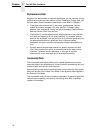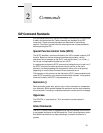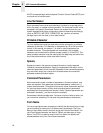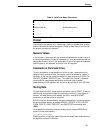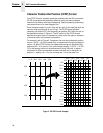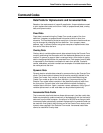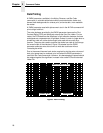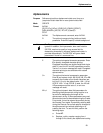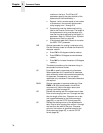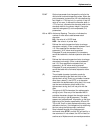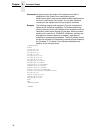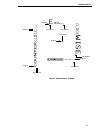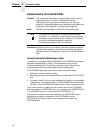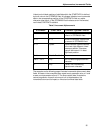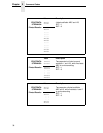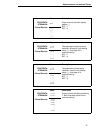
30
Chapter 2 Command Codes
location on the form. The
SR
and
SC
parameters specify the exact location of the
alphanumeric field identified by
n
.
c. Replace
L
with a number equal to the number
of characters in the dynamic alphanumeric
string ranging from 1 through 512.
d. Dynamically enter the alphanumeric string
itself in the Execute Form mode. The length of
the alphanumeric string must be equal to or
less than the value assigned to the length (
L
)
parameter. Refer to “Execute Form: Dynamic
Alphanumeric Data” on page 62.
e. If the dynamic data field is used, do
not
enter
the ASCII TEXT parameter.
DIR
Optional parameter for rotating a character string.
Use the following codes to indicate the direction of
character rotation:
a. Enter CW for 90 degree clockwise rotation.
b. Enter CCW for 90 degree counterclockwise
rotation.
c. Enter INV for inverted characters (180 degree
rotation).
The default orientation prints character strings in
the standard horizontal format.
UC Enter UC to specify uppercase-only characters.
When uppercase-only is specified, all lowercase
alpha character codes are converted automatically
to uppercase. Consequently, do not specify
uppercase-only characters if lowercase characters
are required.
DARK Optional parameter to produce bolder text. Enter
DARK or D. (D is also allowed in the ALPHA
command only.) More information about dark
printing is provided on page 28.
SR
Defines the starting row of the alphanumeric data.
Enter a value ranging from row 1 through one less
than the length of the form. Character row or dot
row is specified based on the Scale command
(page 83), or use the CP.DP format (page 26).
SC
Defines the starting column of the alphanumeric
data. Enter a value ranging from column 1 through
one less than the width of the form. Character
column or dot column is specified based on the
Scale command (page 83), or use the CP.DP
format (page 26).



